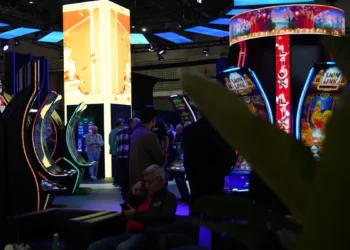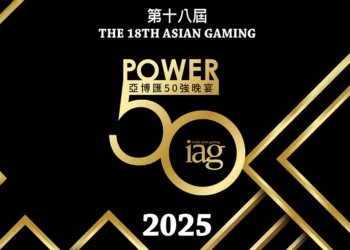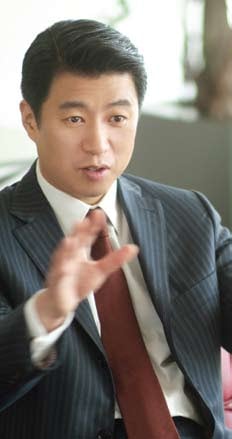 31 (15) Philip Chun
31 (15) Philip Chun
Chairman and CEO
Paradise Group
Paradise Group has around 40% of the market by revenue for foreigners-only casino play in South Korea. South Korea’s total market is annually worth about US$2 billion, but US$1 billion of that is spent at Kangwon Land—the only one of the country’s 17 casinos catering for domestic players.
Philip Chun, chairman of Paradise Group since 2004, presided over an 11% increase in sales for this private sector South Korean casino operator during 2010. That was actually a year-on-year fall in the rate of sales growth. In 2009, the group—which runs five foreigners-only casinos in Korea mainly catering for junket players from China and Japan, plus a boutique property in Nairobi, Kenya—managed a 21.3% increase in sales compared to 2008. It’s worth pointing out, however, that from the beginning of financial year 2011, Paradise changed the way it calculates sales, introducing tighter controls on free chips and agent commissions.
As a result of these changes and an improvement of the operator’s overall hold rate from 13% to 14.3%, CLSA Asia-Pacific Markets in May issued a generally positive report about Paradise. It said first quarter 2011 earnings growth of 27% year-on-year had beaten its own forecasts and those of other analysts. CLSA added that although around 15% of Paradise customers are from Japan, there was no noticeable fall off in visitor numbers and sales at the end of that quarter, despite the devastating earthquake and tsunami in Japan on 11th March.
The company’s flagship property is Paradise Walkerhill Casino, founded in 1968 in the South Korean capital, Seoul. The group also has a spa and hotel in Dogo, Chungnam. Paradise Casino, located at Haeundae Beach at the port city of Busan, opened in 1981 and offers live games including blackjack, baccarat and roulette, along with 40 slot machines.
Paradise Grand Casino, located in the Grand Hotel, Jeju Island, is five minutes from the local airport, and offers various table games and 50 slot machines. Lotte Casino, also on Jeju, offers customers 87 Las Vegas-style gaming machines in two private VIP rooms.
Paradise Casino Incheon was the first South Korean casino opened to foreigners in 1968. It was renamed Golden Gate Casino when it moved to the Hotel Hyatt Regency Incheon near the city’s airport in August 2005.
In August, Daishin Securities said second quarter results producing revenue of KRW80.4 billion (US$75.5 million)—a year-on-year growth of 23.7%—had been driven mainly by visitors from China. Daishin described Paradise as “an undervalued China play”.
There are a number of opportunities and challenges awaiting Paradise in the next few years. On the opportunities side, the South Korean casino market is likely to undergo some liberalisation by 2015, with the probable ending of Kangwon Land’s monopoly on serving domestic customers. At least one more domestic casino concession and/or licence is likely to be issued. In addition, up to five international-standard casino resorts with integrated entertainment facilities will also be allowed in South Korea. If Paradise successfully pitches for one or more of these opportunities, it could dramatically improve the commercial performance of the group in the medium- to long-term. Set against that, the risk is that the South Korean government will opt to introduce into the market foreign casino companies with proven track records in running integrated resorts—in the way Macau did. Another downside risk is that if Japan ever does organise itself sufficiently to legalise casino gaming, it could cause some cannibalisation of South Korea’s market in Japanese gambler tourism. Around 800,000 Japanese visited South Korean casinos in 2010, according to data collated by CLSA.
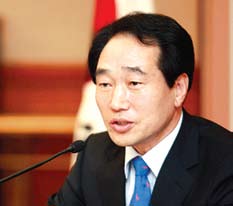 32 (23) Choi Hung-jib
32 (23) Choi Hung-jib
CEO and President
Kangwon Land, Inc
In July, Choi Hung-jib was named as new CEO of South Korea’s only gaming resort catering to domestic players—Kangwon Land. Mr Choi replaces Choi Yung, who resigned after being questioned by police over corruption allegations.
Choi Hung-jib, 60, is a former governor of Gangwon province—the economically depressed area where Kangwon Land is located. He is the seventh boss of the resort since it was founded in 2003 as in effect a regional sovereign wealth fund, designed to plough its profits back into the regional economy and community.
Kangwon Land handles a great deal of money indeed. Eager city dwellers pay local grannies the equivalent of hundreds of US dollars just for reserving a seat for them at the tables at weekends. The property generates gross revenues in excess of US$1 billion per year—about one sixth of the revenue generated in 2010 by the entire Las Vegas Strip. It’s perhaps not surprising, therefore, that at times the resort seems to be a bit of a football for the country’s politicians to kick about. The casino opened in March of 2003 with 30 tables. Following 18 months of steady capacity expansion, the National Gaming Control Commission imposed a cap of 132 tables in November 2004 in line with government orders to limit the casino industry’s income.
Kangwon Land’s casino currently covers nearly 300,000 square feet and also offers 960 video slots that are upgraded regularly via a rolling acquisition programme. There has been much speculation over the past few years that the table cap would be lifted, but that has yet to happen.
A year ago, Kangwon Land was told by lawmakers it could extend its gaming facilities. Work was due to be completed early next year. But it was also told almost in the same breath that it could only apply for more gaming tables after the construction work was finished.
Political involvement in commercial ventures can have its upside as well as downside—especially in East Asia. South Korea chose Gangwon province as the venue when it made a winning bid for the 2018 Winter Olympics. The event will be held at Pyeongchang, up the road from Kangwon Land. The property—which itself has a ski resort—is likely to benefit from the huge influx of visitors expected in the region.
The downside of lawmaker meddling is that no matter how successful Kangwon Land has been—including overcoming the not inconsiderable handicap of being 125 miles and four hours’ driving east along a difficult winding road from the country’s capital, Seoul—as a publicly-owned venture, it constantly risks having the rug pulled from under it.
This year national politicians broke more news to the management. They told Kangwon Land that in principle it would lose its exclusive right to serve domestic gamblers when the original authorization expires in 2015. Even worse, there’s talk of granting a licence for a domestic players’ casino at Incheon. That city is just up the road from Seoul and in the middle of the country’s most populous conurbation, which is home to 24.5 million people—half of South Korea’s entire population. It will be interesting to see whether Seoulites will still be willing to spend hours driving to Gangwon for their casino fun if they have an alternative on their doorstep.
It’s not all bad news for Kangwon Land though. In anticipation of the Winter Olympics, the national government is planning to build an upgraded road to connect Pyeongchang and the county of Jeongseon, where Kangwon Land is situated.
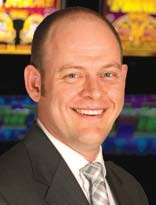 33 (-) Andrew Hely
33 (-) Andrew Hely
Vice President Asia Pacific
IGT Asia
Following on from a highly successful role heading up IGT’s Australian & New Zealand operations as Managing Director, Andrew Hely was appointed IGT’s Vice President for Asia Pacific in September 2011. Since joining IGT in 1995, Mr Hely has become wellknown within the company for his hands-on approach to business and strong rapport with customers. He also brings with him an in-depth understanding of the Asian market from his previous experience as IGT’s Finance Director.
IGT unveiled the new IGT bluechip Neo™ gaming machine for the Asian market at this year’s Global Gaming Expo Asia in Macau. IGT showcased six Asian-themed progressive jackpot games—including Dragon Master™, Extra Chance Jetsetter Beijing™ and Fortune Koi™—as well as a new theme bank. Many of these games are based on products that had been well received by IGT’s Australian gaming market. The IGT bluechip Neo™ features an ergonomic design for enhanced player comfort, together with a host of other features and popular games.
The new Asian-themed games on the IGT bluechip Neo™ act as a natural complement to the company’s portfolio of award-winning global games. IGT has one of the widest game libraries in the Asian market, featuring instantly recognisable licensed themes, as well as all-star titles such as Crown of Egypt™, 100 Wolves™ and 100 Pandas®.
IGT has successfully installed its integrated systems and machine solutions across Asia. IGT’s Advantage system—a comprehensive gaming business solution—can be found in casinos throughout Macau, and its server-based gaming system, sbX™, is installed elsewhere in the region.
IGT also recently increased its presence in the interactive gaming arena. In June 2011, it acquired Entraction Holding AB—formerly known as 24hPoker Holding AB—a Sweden-based digital gaming company. The acquisition gives IGT access to Entraction’s online gaming software for betting, bingo, poker and other games to supplement its current strengths in the interactive market. This latest addition to the IGT interactive business makes IGT one of the leading ‘business-to-business’ providers of online and mobile gaming solutions for regulated gaming markets worldwide.
Andrew Hely’s vast experience in the gaming industry, coupled with IGT’s renewed focus on market-attuned products for the Asian region, puts IGT in a strong position to deliver world-class products and services across Asia in the coming years.
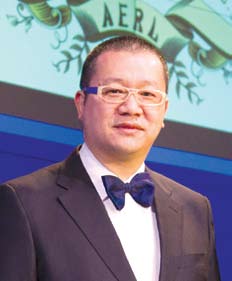 34 (-) Lam Man Pou
34 (-) Lam Man Pou
Chairman
Asia Entertainment & Resources Ltd
Asia Entertainment & Resources Ltd (AERL) is one of Macau’s new generation of stock market-listed junket investors. The company has expanded its business rapidly both by acquisition and organic growth since it entered the market in 2009.
AERL was formerly known as CS China Acquisition Corp. It acquired Hong Kong company Asia Gaming & Resort Limited (AGRL) in February 2010. The reason for that acquisition is that AGRL is a holding company for Macau VIP gaming promoters. After injecting those assets into the AERL vehicle, AERL then achieved listing on Nasdaq in New York in July 2010.
AERL operates—via AGRL and its subsidiaries—VIP rooms on a commission basis at Galaxy’s StarWorld Hotel & Casino, The Venetian Macao, and since mid-May, Galaxy Macau on Cotai. AERL now has a total of 29 high roller tables in the world’s hottest VIP market.
Lam Man Pou is the founder, and has been the chairman, chief marketing officer and a director of AGRL since its inception in May 2007. Since 2010, he has also been chairman of AERL. He is responsible for the overall direction and development of AGRL, its subsidiaries and VIP gaming promoters. He is also in charge of developing AGRL’s and its VIP gaming promoters’ marketing programmes.
Mr Lam is a Macau permanent resident and has been involved in the gaming industry in the territory for more than 20 years. He had served as a junket agent for various VIP gaming rooms in SJM casinos and Galaxy’s Waldo Casino before setting up his own gaming promotion business in May 2006.
After starting to work for himself, Mr Lam made a steady ascent of the Macau VIP room career ladder—the top of that ladder being generally to become either a junket consolidator or a stock market-listed junket investor.
From March 1990 to May 2002, Mr Lam was a junket agent for the casinos of Sociedade de Turismo e Diversoes de Macau, S.A.—the Macau entity that ran Dr Stanley Ho’s Macau casino monopoly until market liberalisation in 2002. At the start of June 2002 through to May 2005, Mr Lam was a junket agent for Casino New Century in Taipa—a casino licensed by Dr Ho’s postmonopoly company Sociedade de Jogos de Macau, S.A. Overlapping that period—from July 2004 to May 2006—he also took on a role as junket agent for Waldo Casino. From May 2006 to early July 2007, Mr Lam was the sole proprietor of the Sang Heng and Spring VIP Gaming rooms in Macau. Not surprisingly, after such extensive experience of the Macau high roller segment, Mr Lam is acknowledged by his peers as an expert. He’s a member of the Macau Gaming Industry General Association of Administrators and VIP Gaming Promoters.
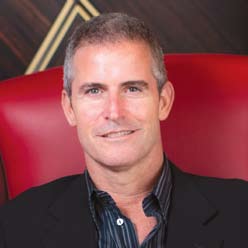 35 (34) Larry Mullin
35 (34) Larry Mullin
CEO and Managing Director
Echo Entertainment Group
After a 20-year career in casino operations in the United States, Larry Mullin was appointed to head up Echo Entertainment Group, formerly Tabcorp’s Casinos Division, in February 2009. When Tabcorp separated its casino properties from its wagering, gaming and keno businesses in June 2011, Mr Mullin became CEO and Managing Director of Echo Entertainment Group, a new standalone company.
Comprised of four businesses—hospitality, dining, nightlife and gaming—Echo Entertainment is one of Australia’s largest publicly-listed gaming companies. The group operates four hotel and casino complexes, including its flagship Star City casino in Sydney. Under Mr Mullin, the casinos operation has been aggressively pursuing business from Asian high rollers visiting Australia. Previously in Australia, non-resident Asian VIPs were most likely to take their business to Crown Melbourne. There have been repeated though unconfirmed rumours that James Packer, the Chairman of Crown Ltd, would like to take over some or all of Echo Entertainment’s casino assets. Some analysts have read this as Crown’s tacit acknowledgement of Echo Entertainment’s success under Mr Mullin’s guidance.
Back in the world of business facts rather than business speculation, Mr Mullin is responsible for overseeing a period of significant change for the Echo casinos. That includes the US$860 million redevelopment of Sydney’s Star City and the expansion and refurbishment of Jupiters Gold Coast, Treasury Brisbane and Jupiters Townsville at a cost of US$625 million.
Mr Mullin has had an influential role in developing the non-gambling offer of the casino industry in the United States. Prior to taking up his position with Echo Entertainment Group in Australia, he served as President and Chief Operating Officer with The Borgata Hotel Casino and Spa, originally a joint venture between Boyd Gaming Corporation and the then MGM MIRAGE, in Atlantic City.
Starting in the casino industry as a concierge, Mr Mullin climbed the ranks at Harrah’s in Las Vegas and worked closely with Donald Trump at various Trump resorts. When he received an offer to take the helm at Borgata, Mr Mullin jumped at the opportunity. Prior to the opening of Borgata, Atlantic City had not welcomed a new casino for 13 years. In the run up to The Borgata’s opening in 2003, Mr Mullin led the marketing of the new property as Executive Vice President. In that role, he was responsible for everything from casino operations marketing to brand management, while playing a pioneering role in bringing high-calibre entertainment to Atlantic City.
Mr Mullin sums up his business philosophy as being about building personal relationships and providing the best customer service. That, he says, is the way to create world-class venues with a comprehensive offering of entertainment.
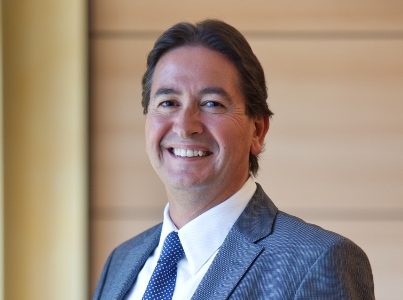
36 (35) Sebastian Salat
President
WMS International
Sebastian Salat has focused intensively on bringing WMS International’s systems applications to Asia this year. Systems are an important and growing driver of casino equipment sales and recurring revenues in Asia. That’s been a natural progression as the regional industry moves beyond the initial ‘build’ phase to a consolidation phase and as its marketing and data networks mature.
As President of WMS International, Mr Salat’s responsibilities cover a range of key functions including overseeing business strategy, market development, sales and distribution and operations for WMS International. The company’s global footprint has grown under his leadership and presently WMS International generates more than 30% of WMS global new unit sales. His and the company’s focus has been on bringing new gaming experiences to players, and better value to operators in the region. That’s being delivered in three ways: via WMS’s Innovation product series; via introduction of the company’s WAGE-NET® technology, and by aligning the maths of WMS games and products to Asian players’ preferences.
Over the past year, Mr Salat has introduced WMS Innovation Series products such as Cascading Reels™ and Money Burst™ themes to Asian market operators. They are designed to engage players with heightened ‘Big Win’ celebrations, synchronized lighting and special audio effects. There’s also a degree of interactivity via the company’s Community Gaming™ and Sensory Immersion products and via its progressive slots.
Most notably, Mr Salat has focused on bringing the WAGENET suite of platform technologies and system applications to the Asian market. WAGE-NET has been developed to help increase the revenue generating capabilities and operational efficiency of casino gaming floors while providing differentiated player experiences. WAGE-NET’s Portal Game Enablement technology makes use of digitally delivered gaming content across a casino floor or across multiple floors in a jurisdiction. That allows it to extend the life cycle of base game themes. The first commercially available WMS Portal application ‘family’ is the Ultra Hit Progressive (UHP) series. To provide Asian operators with maximum flexibility and ease of implementation, Mr Salat made UHP available at the level of individual banks of machines on the casino floor. Mr Salat introduced the UHP Networked Gaming Portal ‘family’ of products at this year’s G2E Asia in Macau, citing a preference among Asian players for mystery-driven jackpots and multi-level progressives.
The G+™ Deluxe series of games has also been a focal point for WMS in Asia. It utilises 30% larger, highly detailed reel symbols, optional game statistics, amped-up win celebrations and synchronised lighting and audio effects.
Mr Salat’s recipe for achieving success as a trusted supplier of casino gaming equipment is based on having local and cultural knowledge, as well as service capabilities in each region of operation. In addition to its headquarters in the United States, WMS has international offices in Macau, Australia, Italy, Holland, South Africa, Spain, Argentina and the United Kingdom.
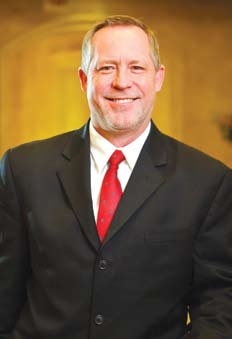 37 (39) Gregory S. Gronau
37 (39) Gregory S. Gronau
CEO
Gaming Partners International
Gaming Partners International continues to solidify its presence as a discrete but vital pillar in the Asian gaming scene. It’s vital as the major manufacturer and supplier of casino currency in Asian casino jurisdictions. It has 90% of the casino chip market share in Macau and 100% of the Singapore market. If you have played a casino live table game in Macau or Singapore, it’s likely you have used a GPI product.
GPI is also discrete—in the sense of being separate or independent. It’s been able to balance the needs of working commercially in the interests of its shareholders while putting the operational and security needs of the regional casino industry and its players at the forefront of the enterprise.
In addition to casino chips, GPI also manufactures and supplies plaques and jetons under the Paulson, Bourgogneet-Grasset and Bud Jones brands. It also produces table layouts, playing cards, table accessories, gaming furniture and dice. The company is based in Las Vegas, with offices around the world, including in Macau.
As the company’s chief executive officer, Gregory Gronau has overseen a number of recent expansion initiatives. In April 2011, GPI announced that it had acquired assets belonging to French plastic injection mold manufacturer OMC Sarl and its subsidiary OMC Industries. The acquisition is expected to help GPI improve its efficiency and capability in casino currency manufacturing and product service.
Mr Gronau described the acquisition as “an important step” in the diversification of GPI’s internal product development and manufacturing capabilities.
Last year, Mr Gronau oversaw an agreement to license radio frequency identification (RFID) tracking technology for casino currency. The deal with fellow US-based gaming equipment supplier International Game Technology gives GPI the ability to develop, manufacture and distribute high-frequency RFID products and systems worldwide.
Mr Gronau has signalled in GPI’s 2011 first quarter results that the company continues to value Asia as a range of vibrant and important markets for the gaming industry, with a number of new properties opening or scheduled to open in the next few years. For the first three months of this year, GPI recorded revenues of US$17.8 million and net income of US$1.7 million, mostly due to strong sales of casino chips to Macau.
“We are pleased with our strong first quarter results, due to delivery of a significant chip order for the Galaxy Macau casino opening,” says Mr Gronau.
Prior to assuming his role as CEO and President of GPI, Mr Gronau served as the company’s chief operating officer from October 2008 to September 2009. He has also worked in senior executive positions with gaming equipment companies Cadillac Jack in Georgia, Shuffle Master Inc. in Las Vegas and WMS Industries in Chicago.
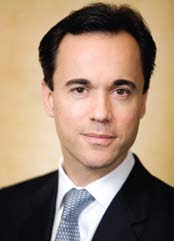 38 (-) Lloyd Nathan
38 (-) Lloyd Nathan
CEO
Asian Coast Development (Canada) Ltd
After 12 years as a senior executive with MGM MIRAGE, Lloyd Nathan was named last year as the new Chief Executive of Asian Coast Development (Canada) Limited (ACDL), the owner and developer of the under-construction Ho Tram Strip in southern Vietnam.
After just over a year in the job, Mr Nathan has firmly placed ACDL and the Ho Tram Strip under the global spotlight. He secured equity and debt financing of more than US$400 million for the first phase of the MGM Grand Ho Tram, the first of five large scale integrated gaming resorts on the site. He is also overseeing and driving the construction for phase one of the Ho Tram Strip, which is expected to complement Macau and Singapore as the next world-class, large-scale gaming destination in Asia. ACDL is backed by New York hedge fund Harbinger Capital, US regional gaming operator Pinnacle Entertainment and MGM Resorts International.
The first phase of the MGM branded resort will open in 2013. It will feature a 13,600 square foot casino and 541 guest rooms. Phase two of the MGM Grand Ho Tram will add an additional 559 hotel rooms and villas with retail, dining and conference facilities. To date, the MGM Grand Ho Tram is the only licensed integrated resort in Vietnam under construction.
In addition to MGM, Mr Nathan is bringing another established gaming operator to the Ho Tram Strip. Earlier this year, Inside Asian Gaming reported that ACDL had sold a 26% equity interest in ACDL to Pinnacle Entertainment for US$95 million. Pinnacle, which has gaming operations in the US states of Louisiana, Missouri, Indiana and Nevada, will be involved in the development of the second of five resorts planned for the Ho Tram Strip.
Mr Nathan began his career in the gaming industry in 1991, acting as outside counsel to MGM Grand, MGM Studios and Kirk Kerkorian. He is a former President of Global Gaming Development for MGM MIRAGE (now known as MGM Resorts International) and has a successful track record of building gaming businesses in Asia.
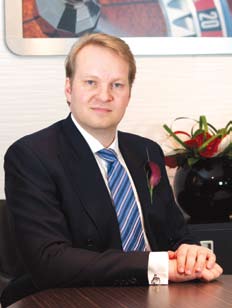 39 (38) Tristan Sjöberg
39 (38) Tristan Sjöberg
Managing Director Asia
TCSJohnHuxley
Tristan Sjöberg was born in Sweden and educated in the United Kingdom. He started his career as a Scientific Officer at the Plymouth Marine Laboratory in the UK, but after five years joined the family business, Knutsson Holdings, the parent company of TCSJOHNHUXLEY. The family conglomerate spans the entertainment sector with a focus on gaming, both as an operator and supplier of gaming equipment.
TCSJOHNHUXLEY prides itself on being a one-stop shop for casino gaming products as well as one of the world’s largest suppliers of table games and equipment. Its range covers everything from multi-station, multigame electronic table games, live tables and layouts, table displays, chippers and gaming accounting and security systems.
It was one of the first suppliers to develop the concept of modular marketing—i.e., competing for business across a whole casino floor or section of floor rather than simply supplying products on a one-off basis. Once it has achieved a floor-wide success, its aim is to leverage that to supply all kinds of add-on services and products. The company scored an important success last year when it won major orders for electronic table games at the newly opened Resorts World Sentosa and Marina Bay Sands casino resorts in Singapore. It included a deal for 100 Novo Unity™ II TouchBet® Roulette terminals at RWS.
Mr Sjöberg relocated to Singapore from London at the start of 2009. The move coincided with the group’s expansion programme in the Asia Pacific region. That involved the long-term development of manufacturing, sales, service and support capability in Asia’s rapidly expanding and increasingly important casino gaming markets. The opening of TCSJOHNHUXLEY’s Singapore office—its regional headquarters—means the company now has 11 centres, all located in major gaming jurisdictions around the globe.
TCSJOHNHUXLEY is also an active and major player in Macau’s gaming scene. The company has had major product launches over the past few years at Sands Macao, Galaxy’s StarWorld, MGM Macau, City of Dreams and, most recently, at Galaxy Macau. TCSJOHNHUXLEY has also completed other large-scale projects across the Asia Pacific region, including at the Savan Vegas casino in Laos, NagaWorld in Cambodia, and Kangwon Land, currently the only casino in South Korea catering for Korean nationals.
Under Mr Sjöberg’s leadership, TCSJOHHUXLEY has developed its policy of sourcing materials regionally where possible, and has assembled a talented pool of technical development staff. It has also developed a plan for working cooperatively with other suppliers to help market new products. TCSJOHNHUXLEY recently signed a deal with SASIAN Gaming to distribute two new no-commission baccarat games. The games—BaccaraX and BetterBAC—were launched at G2E Asia in Macau in June.
All these policies should mean TCSJOHNHUXLEY is well placed to produce a pipeline of innovative products in the highly competitive regional markets for electronic table games, live table games and systems and peripherals for years to come.
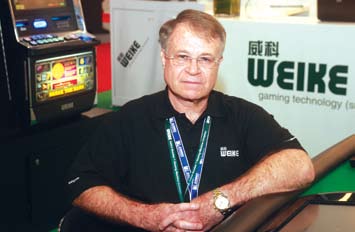 40 (40) David Kinsman
40 (40) David Kinsman
Non-Executive Director, Weike Gaming Technology
Independent Gaming Consultant
In the first half of 2011, David Kinsman stood down as CEO of Weike and became a Non-Executive Director of the company. Under his leadership, Singapore-based gaming machine maker Weike positioned itself to move to a new level in terms of slot ship share in Asian markets and win per unit per day.
In 2008, Mr Kinsman hired Andrew Masen, former game design manager for Australian supplier Stargames (now part of Shuffle Master) as head of game development. Under Mr Masen’s guidance, Weike ramped up its game maths and graphics. Chinese-focused and Chinese-themed games such as The Brotherhood, Phoenix Dance and Dragon Legend proved that Weike was able to offer strong performance in the highly-competitive Macau market. Under Mr Kinsman, the company also built up recurring revenue from electronic game management systems and value-added services such as slot venue management—via a subsidiary, Weike (G) Management Macau Ltd—in Macau.
In December last year, Weike (G) Management took over the operation of the slot machines and electronic table game (ETG) terminals at a major Macau casino—which had previously used a different third-party slot operator. The new operation added to the 237 slots run by Weike (G) Management at another recently-expanded venue also located on Macau peninsula.
On Mr Kinsman’s watch, the company was also accepted as an Approved Manufacturer and Approved Supplier of gaming machines and gaming equipment by Singapore’s Casino Regulatory Authority. Weike’s senior personnel—including Mr Kinsman—passed all the rigorous technical competence and personal probity checks required by the Authority.
The company expanded into new regional markets under his stewardship. Weike now has product in South Korea for the first time.
Mr Kinsman started his gaming career with Olympic Video Gaming in Australia, which became Australasia’s No. 2 manufacturer under his leadership. The company was eventually sold to IGT Group in 1997 for A$178 million (US$188 million at today’s prices). Mr Kinsman also served as General Manager of Vidco, launching multiterminal gaming products. Vidco was then sold to another group and renamed as Star Games in 1991.
Between 1994 and 1998, he served twice as Director of AGMMA, the Australian Gaming Machine Manufacturers’ Association (now known as the Gaming Technologies Association).
In 2004, Mr Kinsman was headhunted by the online gaming provider Mansion Group as COO, creating ‘The Poker Dome’, a television series featuring poker games between the world’s top players betting their own money. It became one of the toprated shows on the Fox Network in the United States and beyond, generating a large pool of clients for Mansion.























